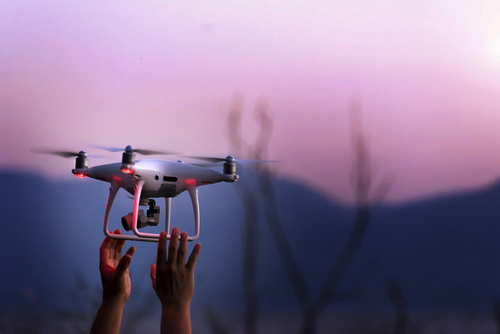What “Drone Swarm” Farming Means for the US Agriculture Industry
April 8, 2024 4:28 pm Leave your thoughts
The agriculture industry in the United States has always been at the forefront of innovation, adopting new technologies to increase efficiency, productivity, and sustainability. One of the latest technological advancements making waves in the field of agriculture is drone swarm farming. Drone swarm farming involves the use of multiple drones working together in synchronized coordination to perform a variety of tasks on farms, from planting seeds and applying fertilizers to monitoring crop health and optimizing irrigation. In this blog post, we will explore the implications of drone swarm farming for the US agriculture industry, including the benefits it offers, the challenges it presents, and its potential impact on the future of farming.
Benefits of Drone Swarm Farming
Drone swarm farming offers a wide range of benefits for farmers and the agriculture industry as a whole. Some of the key advantages of drone swarm farming include:
1. Increased efficiency: By utilizing multiple drones working together in a coordinated manner, farmers can accomplish tasks more quickly and efficiently than with traditional farming methods. Drone swarms can cover large areas of farmland in a fraction of the time it would take traditional equipment or labor-intensive methods.
2. Precision agriculture: Drone swarm technology enables farmers to collect real-time data and insights about their crops, soil conditions, and other factors that impact crop growth and yield. This data can be used to make informed decisions about planting, irrigation, fertilization, and pest management, leading to higher crop yields and reduced input costs.
3. Cost savings: By optimizing farm operations and reducing the need for manual labor and equipment, drone swarm farming can help farmers save on costs and improve their bottom line. The ability to perform tasks such as seeding, spraying, and monitoring remotely and autonomously can also lead to reduced labor and fuel expenses.
4. Sustainability: Drone swarm farming promotes sustainable agricultural practices by reducing the use of chemicals, water, and other resources, minimizing environmental impact, and promoting soil health and biodiversity. By relying on data-driven insights and precision agriculture techniques, farmers can make more sustainable and environmentally-friendly decisions about crop management.
Challenges of Drone Swarm Farming
While drone swarm farming offers numerous benefits, it also presents challenges and obstacles that need to be addressed for widespread adoption and success in the agriculture industry. Some of the key challenges of drone swarm farming include:
1. Regulatory hurdles: The use of drones in agriculture is subject to regulations and restrictions imposed by government agencies, such as the Federal Aviation Administration (FAA). Farmers and drone operators must comply with regulations related to drone registration, airspace restrictions, pilot certification, and data privacy, which can add complexity and cost to drone swarm farming operations.
2. Technological limitations: The technology required for drone swarm farming, including drone hardware, software, and communication systems, is still evolving and may not be readily available or affordable for all farmers. Integrating multiple drones into a coordinated swarm and ensuring seamless communication and coordination among drones can be technically challenging and require specialized expertise.
3. Data management and cybersecurity: Drone swarm farming generates vast amounts of data, including aerial imagery, sensor readings, and crop health assessments, which need to be managed, analyzed, and secured to ensure data integrity and privacy. Farmers must have robust data management and cybersecurity protocols in place to protect sensitive information and prevent data breaches or cyberattacks.
4. Training and skill development: Adopting drone swarm technology requires farmers and farm workers to acquire new skills and expertise in drone operation, data analysis, and precision agriculture techniques. Training programs, educational resources, and technical support are essential for farmers to successfully implement drone swarm farming and maximize its benefits.
Potential Impact on the Future of Farming
Despite the challenges and obstacles, drone swarm farming holds great promise for the future of agriculture in the United States. The adoption of drone swarm technology is expected to revolutionize farming practices, increase productivity and sustainability, and drive innovation in the agriculture industry. Some of the potential impacts of drone swarm farming on the future of farming include:
1. Improved productivity and profitability: Drone swarm farming can help farmers increase crop yields, reduce input costs, and optimize farm operations, leading to improved productivity and profitability. By leveraging data-driven insights and precision agriculture techniques, farmers can make more informed decisions and achieve better outcomes for their crops.
2. Sustainable agriculture practices: Drone swarm farming promotes sustainable agriculture practices by enabling farmers to use resources more efficiently, reduce chemical usage, and minimize environmental impact. By adopting precision agriculture techniques and leveraging real-time data and analytics, farmers can make sustainable and environmentally-friendly choices that benefit both their farms and the environment.
3. Innovation and technological advancement: The adoption of drone swarm technology is driving innovation and technological advancement in the agriculture industry, leading to the development of new tools, solutions, and applications for farmers. As drone swarm farming becomes more widespread and accessible, new opportunities for innovation and collaboration are emerging, leading to a more dynamic and competitive agriculture sector.
4. Rural development and economic growth: The implementation of drone swarm farming has the potential to stimulate rural development and economic growth by creating new job opportunities, supporting local businesses, and attracting investment in agriculture technology and infrastructure. By harnessing the power of drone swarm technology, farmers can enhance their competitiveness, expand their markets, and contribute to the economic vitality of rural communities.
Summary
Drone swarm farming represents a transformative and disruptive technology that is reshaping the agriculture industry in the United States. By harnessing the power of drones, data analytics, and precision agriculture techniques, farmers can optimize farm operations, increase productivity, and promote sustainability. While drone swarm farming presents challenges and obstacles that need to be addressed, its potential benefits and impacts on the future of farming are vast and promising. As drone swarm technology continues to evolve and become more accessible, farmers have the opportunity to embrace innovation, drive growth, and secure a prosperous future for the US agriculture industry.
Need Cotton Mill & Cotton Gin Components in Lubbock, TX?
Welcome to M.B. McKee Company, Inc. M.B. McKee Company, Inc. has been serving our local community of Lubbock since 1943. Locally owned and family operated, we provide great customer service and solutions for ongoing issues. With over 70 years of experience, our products, services, and engineering will always exceed your expectations. Our products include bearings, belts, chains, conveyor systems, gearing, lifts, motors, drives, product separation, tools, valves, and fittings. Our engineering division also provides general formulas, NEMA motor frames, elevator legs, screw and belt conveyors, lift charts, components from Baldor and Flexco, and various interchangeable parts. Contact us today to learn more about what we can do for you!
Categorised in: Drones
This post was written by admin

